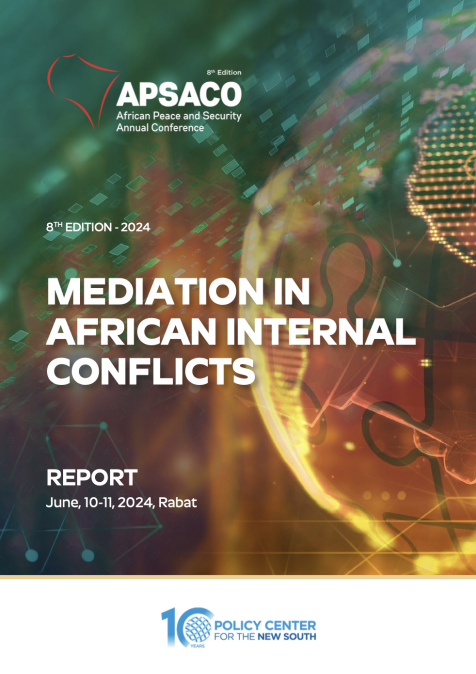Publications /
Annual Report
Book / Report
The African Peace and Security Annual Conference (APSACO) just concluded its 8th edition, serving as a crucial platform for discussing conflict prevention and management in Africa. APSACO has fostered a vibrant community that facilitates dialogue on Africa’s unique challenges and allows for the exchange of innovative ideas on conflict resolution. The Policy Center for the New South (PCNS) is proud to be an active participant in this ecosystem, contributing to key initiatives such as the African Union (AU) Policy Framework on Post-Conflict Reconstruction and Development (PCRD), adopted by the AU Assembly of Heads of State in February 2024.
APSACO is distinctive in its ability to analyze African issues from the continent’s perspective while recognizing the interdependence between Africa and the global context. In conflict resolution, there is no universal model, and peace must be nurtured through local and regional solutions in addition to multilateral approaches promoted by the United Nations.
This year’s theme, "Mediation in Internal African Conflicts," highlights the growing importance of mediation within Africa, particularly in the context of African Union initiatives. African mediation processes integrate unique African norms, such as the principle of subsidiarity championed by Regional Economic Communities (RECs), while facing obstacles like institutional fragmentation, conflicting national interests, and the challenge of fostering innovative engagement between the AU and RECs, as well as the partnership between the UN and AU.
APSACO provides a critical forum for addressing these challenges through dialogue on key areas such as African mediation mechanisms, the coordination of local, regional, and continental efforts, strategies for fostering synergies between the AU and civil society, the complexities of the Sahelian crisis, and the vital role of civil society in peace processes. With evolving security dynamics across the continent, APSACO underscores the growing need for African mediation expertise and offers recommendations such as creating a mediation training panel to further develop these essential skills.











